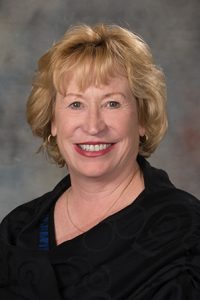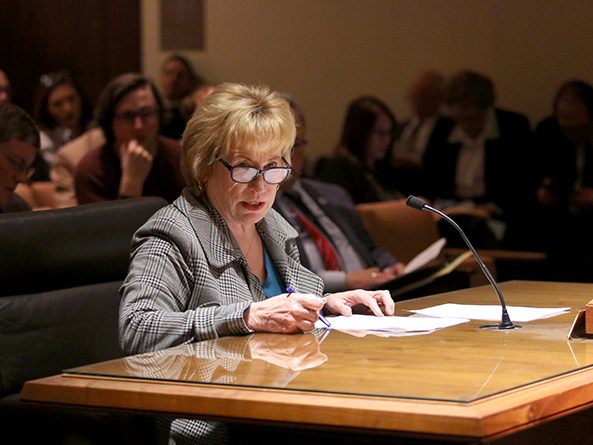Constitutional limit on local property tax increases proposed
Cities, counties and school districts could not increase the amount of property taxes they collect by more than 3 percent from year to year under a proposed amendment to the state constitution heard Feb. 27 by the Revenue Committee.
LR8CA, introduced by Elkhorn Sen. Lou Ann Linehan on behalf of Gov. Pete Ricketts, would place the proposal on the November 2020 general election ballot. If voters approve it, the amendment would limit the total amount of property tax revenue raised by a political subdivision in any fiscal year to 3 percent greater than the amount raised the previous fiscal year.
A political subdivision could exceed that limit by a specific amount only if a majority of legal voters approve in a special election.
The limit would not apply to the property tax revenue needed to pay the principal and interest on a political subdivision’s bonded indebtedness.
Linehan said the measure is an attempt to slow spending by local governments, which rely heavily on property taxes to fund their operation. Controlling school spending is especially important if the Legislature increases state aid to public schools in an effort to reduce the state’s overreliance on property taxes to fund public education, she said.
“If we’re going to step up to the plate and we’re going to pick up a large portion of the funding for all schools,” Linehan said, “we also owe it to the taxpayers … to make sure we get control on the spending.”
Ricketts testified in support of the resolution. He said limiting increases in property tax revenue is the only way to achieve sustainable tax relief.
Coby Mach testified in support of the proposal on behalf of the Lincoln Independent Business Association. He said the amendment would not restrict political subdivisions from increasing their budgets using other sources of revenue, such as sales tax, occupation tax or federal grants.
“In order for any property tax reduction proposal to make a lasting impact,” Mach said, “we believe it must rein in property tax spending at the local level where the property taxes are actually levied.”
Lincoln city council member Roy Christensen testified in support of the resolution on his own behalf, saying it would enhance local control.
“For most Nebraskans, they don’t have the time to show up to the numerous budget meetings for their school, city, county and so forth,” he said. “With LR8CA, the people can vote to override the 3 percent cap if they believe local government needs additional resources.”
Frederic Oltjenbruns also testified in support. Oltjenbruns said he and his family farmed near Ceresco until last year when they moved their operation to Missouri because they could not afford Nebraska’s high property taxes. In 2017, Oltjenbruns said, he paid approximately $50,000 in property taxes on 585 acres in Nebraska. His property tax bill on 855 acres is Missouri last year was less than $1,200.
“I hope you guys can straighten this mess out before it goes from maybe the few of us to a landslide of farmers fleeing like refugees to other states,” he said.
Douglas Kindig, mayor of La Vista, testified in opposition to the proposal on behalf of the United Cities of Sarpy County. He said the 3 percent limit on property tax revenue increases would stifle growth in the fastest-growing county in the state.
“Limiting revenue growth not only hinders our ability to maintain the current service level and quality of public services,” Kindig said, “it will impede improvements and the expansion of basic services necessary for growth.”
Jack Moles testified in opposition to the resolution on behalf of the Nebraska Rural Community Schools Association, the Nebraska Council of School Administrators and the Nebraska State Education Association. He said LR8CA would give school districts little room to accommodate rising costs that are beyond their control, such as staff salaries, health insurance and the cost of meeting federal and state regulations.
John Hansen, president of the Nebraska Farmers Union, also opposed the measure. If voters approve the amendment, he said, “the ceiling will become the floor,” meaning local governments would raise their property tax requests to the maximum.
Hansen also cautioned against placing a cap in the state’s constitution because doing so would limit the Legislature’s ability to change the cap if necessary.
“If there is going to be some sort of cost control as a part of a [tax reform] package … the proper place for it would be in statute, and it should not be in the constitution,” he said.
The committee took no immediate action on LR8CA.


